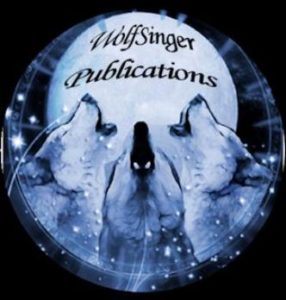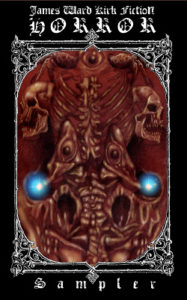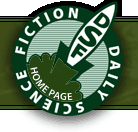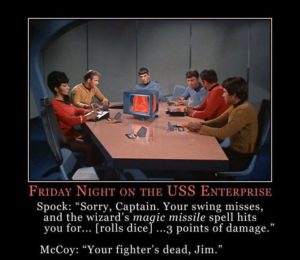I’ve been writing since the mid-1970’s. During that time, I’ve assembled a huge assortment of trunk stories. I could just let them rot away, but I don’t like to waste my time and energy. I poke at them every so often until I find a suitable market and — this part is important — I’m comfortable with the quality of the story.
Over the years I’ve found plenty of different types of markets, ranging from “for the love” to pro-level. If one of my trunk stories will work for a non-paying market, I don’t mind sending it in to the editor. I feel that it’s a better location than a hard drive that will eventually fail. Because I’m a prolific writer, it doesn’t take me long to produce stories. Now that I’m switching to dictation software because of worsening carpal tunnel issues, I expect my output will expand even further.
Here are some of my current favorites:
 This is a small-to-middling sized pro-level Colorado press owned by Kevin J. Anderson and Rebecca Moesta. I’ve done some minor work for them in the past, and they’re publishing a novel I co-wrote with a couple of friends. Everyone there is wonderful to work with, and I know many of them personally.
This is a small-to-middling sized pro-level Colorado press owned by Kevin J. Anderson and Rebecca Moesta. I’ve done some minor work for them in the past, and they’re publishing a novel I co-wrote with a couple of friends. Everyone there is wonderful to work with, and I know many of them personally.
Getting published by WordFire means your work will appear next to books by Kevin and Rebecca, who are both award-winning and NY Times/USA Today bestsellers, plus the likes of Brian and Frank Herbert, Alan Dean Foster, Alan Drury (Pulitzer Prize winner), and a host of name-brand, top-tier authors. An added benefit is the ability to attend some of the best conventions as a WordFire author.
 This is another Colorado publisher, albeit a micro press. Wolfsinger puts out several unique anthologies every year, and sometimes I write a story for them just because the anthology concept excites my muse. They respond to questions quickly and actually do thorough edits.
This is another Colorado publisher, albeit a micro press. Wolfsinger puts out several unique anthologies every year, and sometimes I write a story for them just because the anthology concept excites my muse. They respond to questions quickly and actually do thorough edits.
My story, “Grubstake”, appears in Supernatural Colorado, and a story I’ve sent in to their Love ‘Em, Shoot ‘Em anthology was accepted. They sometimes have guest editors, so it’s nice to work with new folks in a familiar environment. Although this press has a token payment and royalty setup, I can report that I actually do receive royalty statements as promised, which can be a rarity with the token-payment or royalty-only presses. They do offer discounted copies for contributors.
Another benefit of Wolfsinger is they also have a couple of fascinating eZines (The Lorelei Signal and Sorcerous Signals). I’ve been published in The Lorelei Signal, and they also put out a compilation in ebook format. Both can add to your bibliography.
 This micro press run by (no surprise) author and editor James Ward Kirk puts out several unique anthologies per year, plus a couple of annuals. This is a for-the-love or a token payment press (two $25 awards for the top two submissions). I love many of their anthology concepts and come up with complete story ideas by the time I’m done reading the submission requirements on their open call page.
This micro press run by (no surprise) author and editor James Ward Kirk puts out several unique anthologies per year, plus a couple of annuals. This is a for-the-love or a token payment press (two $25 awards for the top two submissions). I love many of their anthology concepts and come up with complete story ideas by the time I’m done reading the submission requirements on their open call page.
I’ve had stories accepted for several of their anthologies, including “We Are Dust and Shadow” for the anthology of the same name; “A Gift of Light” in Bones II; and “The Box”, which appears in Ugly Babies 2. I also have a story in their horror sampler and the Barnyard Horror publications. The anthology editors are great to work with, and they offer good discounts for contributors.
 Another oddball small press that publishes an interesting series of anthologies called Biblical Legends, amongst others. I co-wrote a couple of stories with Tonya L. De Marco about two robots who go about doing horrible things to humans — enough so that they help to create some of the legends and mythologies we have to this day. “One Bit Off” appears in their Garden of Eden anthology, and “Garbage” appears in Sulphurings.
Another oddball small press that publishes an interesting series of anthologies called Biblical Legends, amongst others. I co-wrote a couple of stories with Tonya L. De Marco about two robots who go about doing horrible things to humans — enough so that they help to create some of the legends and mythologies we have to this day. “One Bit Off” appears in their Garden of Eden anthology, and “Garbage” appears in Sulphurings.
Garden Gnome has branched out from ebook-only to some limited print versions. I am always pleased when I have more print books that I can pile on a table at a convention. This is a token-payment publisher, but they’re fun to work with.
 If you’re not signed up for their weekday free stories that appear in your inbox, you’re missing out. This is a small SFWA-approved venue that pays better than pro rates. When they picked up my short story, “A Case of Curiosities”, I was qualified to join SFWA. This is a tough market to crack, but certainly is worth your efforts.
If you’re not signed up for their weekday free stories that appear in your inbox, you’re missing out. This is a small SFWA-approved venue that pays better than pro rates. When they picked up my short story, “A Case of Curiosities”, I was qualified to join SFWA. This is a tough market to crack, but certainly is worth your efforts.
The owners are the editors, and they enjoy a wide range of micro-to-short speculative fiction. They do enjoy mild horror (with a speculative bent) and fantasy. DSF should be one of the first group of publishers you send your best work to. They also on occasion publish a gigantic print anthology of the best works that appeared that year.
♦ ♦ ♦
The bad thing about letting you know about my favorite publishers is that I can now expect more competition for slots. I would suggest you buy several works from each publisher you’re interested in working with to see the types of stories they pick up. Besides, it’s important to support the publishers we all want to succeed.
Best of luck with your submissions!
About the Author:
Guy Anthony De Marco is a disabled US Navy veteran speculative fiction author; a Graphic Novel Bram Stoker Award® nominee; winner of the HWA Silver Hammer Award; a prolific short story and flash fiction crafter; a novelist; an invisible man with superhero powers; a game writer (Sojourner Tales modules, Interface Zero 2.0 core team, third-party D&D modules); and a coffee addict. One of these is false.
A writer since 1977, Guy is a member of the following organizations: SFWA, WWA, SFPA, IAMTW, ASCAP, RMFW, NCW, HWA. He hopes to collect the rest of the letters of the alphabet one day. Additional information can be found at
Wikipedia and
GuyAnthonyDeMarco.com.
 Looking at the options, I could spend $125 for each one or, if I purchased in bulk, the price dropped down to a buck each. I decided to buy a thousand-block and founded The Publishing Consortium, which is a cooperative for a bunch of publishing imprints for my friends and my own little personal publisher.
Looking at the options, I could spend $125 for each one or, if I purchased in bulk, the price dropped down to a buck each. I decided to buy a thousand-block and founded The Publishing Consortium, which is a cooperative for a bunch of publishing imprints for my friends and my own little personal publisher.







 You may wonder why I wouldn’t want this to happen. After all, more eyeballs can mean more sales. The problem is that readers of my horror or science fiction titles go in expecting particular tropes and methodologies. Those few folks who go looking for titles under my (real) name want to read something in the “GADM” style. If they see a new book and buy it, they may get a surprise when they start reading an erotic thriller with lots of sexual tension and graphic sex instead of a horror novel with lots of “Dad” jokes and punny humor.
You may wonder why I wouldn’t want this to happen. After all, more eyeballs can mean more sales. The problem is that readers of my horror or science fiction titles go in expecting particular tropes and methodologies. Those few folks who go looking for titles under my (real) name want to read something in the “GADM” style. If they see a new book and buy it, they may get a surprise when they start reading an erotic thriller with lots of sexual tension and graphic sex instead of a horror novel with lots of “Dad” jokes and punny humor. If you’re going to be writing under different pseudonyms, you need to do a solid analysis of your writing style. There are particular phrases and words that crop up with every author, for example. Think about the first three George Lucas Star Wars movies (in theatre release order). How many times have you heard Darth Vader say “is complete”? It drives me nuts when I hear those words, but it’s a Lucasism. Even the scripts he didn’t completely write have his smudgy thumbprints all over the pages.
If you’re going to be writing under different pseudonyms, you need to do a solid analysis of your writing style. There are particular phrases and words that crop up with every author, for example. Think about the first three George Lucas Star Wars movies (in theatre release order). How many times have you heard Darth Vader say “is complete”? It drives me nuts when I hear those words, but it’s a Lucasism. Even the scripts he didn’t completely write have his smudgy thumbprints all over the pages. While many authors think they have a good idea of what they’re good at, sometimes they’re wrong. This isn’t necessarily a bad thing — in fact, having a couple of things that make you feel comfortable enough to actually sit your butt in a chair and pound a keyboard will help to keep procrastination and “writers block” away. When you feel advanced enough, ask your audience what they think you write best. Understand that you can use this knowledge to improve your writing.
While many authors think they have a good idea of what they’re good at, sometimes they’re wrong. This isn’t necessarily a bad thing — in fact, having a couple of things that make you feel comfortable enough to actually sit your butt in a chair and pound a keyboard will help to keep procrastination and “writers block” away. When you feel advanced enough, ask your audience what they think you write best. Understand that you can use this knowledge to improve your writing. I started to add in things such as verbal tags. In one short story I turned in this week for a submission call, the Captain had a habit of saying “Yes, yes,” while he was thinking what to say next.
I started to add in things such as verbal tags. In one short story I turned in this week for a submission call, the Captain had a habit of saying “Yes, yes,” while he was thinking what to say next.